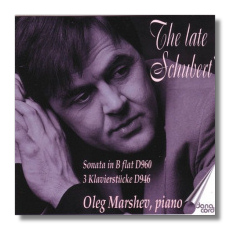
The Internet's Premier Classical Music Source
Related Links
- Schubert Reviews
- Latest Reviews
- More Reviews
-
By Composer
-
Collections
DVD & Blu-ray
Books
Concert Reviews
Articles/Interviews
Software
Audio
Search Amazon
Recommended Links
Site News
 CD Review
CD Review
Franz Schubert

The Late Schubert
- Sonata for Piano in B Flat Major, D. 960
- 3 Klavierstücke D. 946
Oleg Marshev, piano
Danacord DACOCD646 70m DDD
Franz Schubert's late piano works have always been considered as among the greatest piano literature of the romantic period, and for their intensity, wealth of melody and novel brilliance they even rival Beethoven's masterpieces in the genre.
Sketched and completed during 1828, the B Flat, together with the C minor and A Major forms part of the trilogy of works that Schubert wrote during the last year of his life, a year in which he bequeathed to mankind his immortal last symphony, the 'Great' C Major.
D 960's emotional expressiveness encapsulated in a very simple framework of invention, added to the wilful resignation which permeates its spirit, makes it a work that reaches out to our basic inner needs and aspirations and leaves the light of hope flickering deep within our hidden selves.
The 3 Klavierstücke composed also in 1828 are somewhat less personal and the reason behind their creation is not clear. The great Albert Einstein sensed them as parodies of the popular dance styles of Schubert's day, while others have held them as fine examples of the composer's late flourish of genius.
Critics have not always been sympathetic towards them, but their many moments of sincere joy make them stand up well enough. Oleg Marshev's phenomenal skills, aided by his innate sensibility help him to get to the core of these mysteriously divine works, the Sonata in particular. His superb sense of rhythm, coupled with a scrupulous choice of colour, creates naturally atmospheric renditions. An excellent Schubert recital wonderfully recorded and annotated.
Copyright © 2006, Gerald Fenech




















